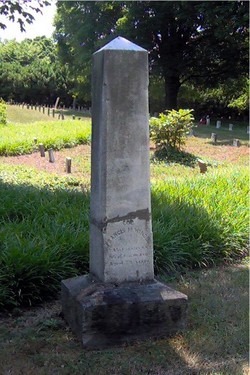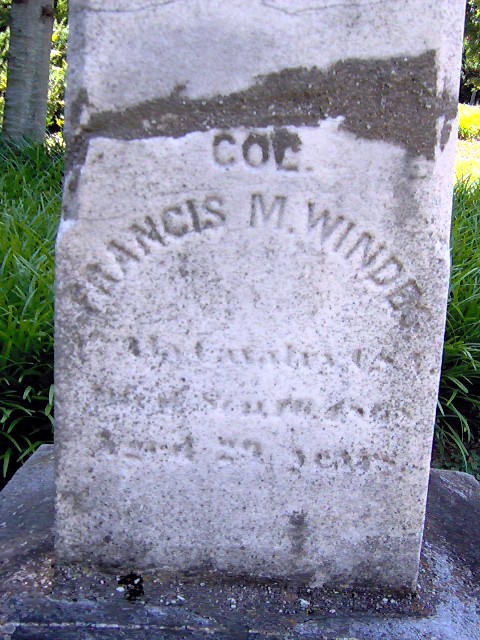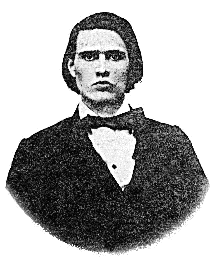4th AL, "Roddey's" Cavalry
The son of Enoch Windes and Mary Ann Ryan was born 1 Jul 1839 in Apple Grove, Morgan County, Alabama.
He married, Julia A. GRAHAM on 1 Apr 1866.
At the famous (June 9, 1864) battle of Tishomingo Creek (Brice's Crossroads), Lt. Col. Windes served as regimental commander while Col. Wm. A. Johnson commanded "Johnson's brigade" (4th Alabama Cavalry, Moreland's Alabama Cavalry, Williams' Cavalry, and Warren's Cavalry) which was included in Gen. Forrest's Cavalry Corps at this brilliant victory. After Col. William A. Johnson was wounded (Sep 27 1864) during a raid on Pulaski, Tennessee, Windes became in full command of the regiment (4th Alabama "Roddey's" Cavalry) once again.
Frank traveled to New York City in answer to an advertisement of a doctor there who claimed he could cure consumption--which it was thought Frank was suffering from. He went to N. Y. but stayed only a short time and started back on the train where he was taken off at Lynchburg, Virginia, and died.
Francis Marion Windes died 16 Sep 1868 in Lynchburg, Virginia.
Buried; 19 Sep 1868.
Source: http://www.geocities.com
/BourbonStreet/Delta/3843/windes.htm
========================================
Colonel Frances Marion Windes
A Vintage Vignette by John P. Rankin
December 24, 2010
For four years I volunteered with research into historical aspects of more than 50 old family cemeteries on Redstone Arsenal for the Army's Office of Environmental Management. My results became part of some ethno-archaeological reports, but I was intrigued that one of the sites was named the Dickson-Rankin Cemetery on arsenal maps. As I learned the history of the families buried there, the Rankin connection linked to my seventh great-grandfather through the lineage of Dr. James Mitchell Cofelt Rankin, second husband of Julia Alabama Graham, granddaughter of arsenal land pioneer James Dickson. That connection was described in a Vintage Vignette published on August 20, 2008. Julia Graham's first husband was Francis Marion Windes. The Windes line is today's subject, but more will be written about Julia's ancestry later.
Frank Windes married Julia in April of 1866, a year after the end of the Civil War. Windes first joined Company H, 12th Alabama Infantry, CSA, as a private. Later in the war he joined Roddey's 4th Alabama Cavalry and was a Lt. Colonel in command of a regiment under General Nathan Bedford Forrest. When Captain James Irvine wrote his 1865 account of the "Affair at Madison Station" (an engagement of rebel troops attacking the occupying Union forces in Madison on May 17, 1864), he mentioned that Colonel Windes was in Decatur, protecting the withdrawal route of Generals Forrest and Hood from Nashville and Franklin, Tennessee.
Frank was the eldest surviving son of Enoch Windes (1809-1872). His ancestry is documented back to Charles "Wines", born in the mid-1500s in Ipswich, County Suffolk, England. The generations are from Charles and his wife Prudence Beacon to Barnabas Windes (1610 England - 1679 Long Island, N.Y.) and his wife Anna Eddy, then through three more generations of Barnabas Windes men and on through two more Enochs before reaching Enoch, the father of Frank. The family came to Massachusetts in the early 1600s and migrated before 1679 to Long Island, New York. By the early 1800s the line migrated to Society Hill, South Carolina. From there the migration was to Missouri, where Frank's father Enoch was born at Sainte Genevieve, Missouri. He worked in lead mines at Potosi at the age of 12 after running away from home where his father did carpentry work and ran an inn at Sainte Genevieve. In Potosi, Windes was involved with Moses Austin and his family, which included Stephen F. Austin, the first Governor of Texas. Eventually, Enoch moved to Morgan County, Alabama, where he taught school at Apple Grove in the southeastern corner of the county. In 1834, Enoch married Mary Ann Ryan, one of his pupils who became the mother of Frank. It was in Apple Grove of Morgan County that Frank was born in 1839. Among Frank's siblings were several Baptist preachers and lawyers, so the family evidently used their exposure to education quite well.
Julia is buried with her second husband (Dr. Rankin) in Decatur, one of the places where her first husband Frank so valiantly served in the Civil War. However, Frank is not buried in this area. In 1868 he traveled to New York City in answer to an advertisement of a doctor there who claimed that he could cure "consumption" (tuberculosis), which it was thought Frank had. He stayed a short time in New York and started back on the train. He died on the train April 16, 1868, and was taken off at Lynchburg, Virginia. As he lay dying in the car, he could barely speak, so fellow passengers searched his pockets and found letters that revealed his name. When it was called out in the car, a gentleman arose and asked if that was Colonel Francis Windes from Alabama. Upon confirmation, the gentleman said that they had served together in Virginia and stated, "A nobler man never lived." Frank is buried at Lynchburg in the Confederate Cemetery. Because of travel difficulties, none of the family could get to the funeral, but a large obelisk was emplaced at the grave by unknown parties. Neither Frank nor Julia were interred in the Dickson-Rankin Cemetery on the arsenal, but their stories are forever linked there.
Contributor: Linda Kelso (48744238)
4th AL, "Roddey's" Cavalry
The son of Enoch Windes and Mary Ann Ryan was born 1 Jul 1839 in Apple Grove, Morgan County, Alabama.
He married, Julia A. GRAHAM on 1 Apr 1866.
At the famous (June 9, 1864) battle of Tishomingo Creek (Brice's Crossroads), Lt. Col. Windes served as regimental commander while Col. Wm. A. Johnson commanded "Johnson's brigade" (4th Alabama Cavalry, Moreland's Alabama Cavalry, Williams' Cavalry, and Warren's Cavalry) which was included in Gen. Forrest's Cavalry Corps at this brilliant victory. After Col. William A. Johnson was wounded (Sep 27 1864) during a raid on Pulaski, Tennessee, Windes became in full command of the regiment (4th Alabama "Roddey's" Cavalry) once again.
Frank traveled to New York City in answer to an advertisement of a doctor there who claimed he could cure consumption--which it was thought Frank was suffering from. He went to N. Y. but stayed only a short time and started back on the train where he was taken off at Lynchburg, Virginia, and died.
Francis Marion Windes died 16 Sep 1868 in Lynchburg, Virginia.
Buried; 19 Sep 1868.
Source: http://www.geocities.com
/BourbonStreet/Delta/3843/windes.htm
========================================
Colonel Frances Marion Windes
A Vintage Vignette by John P. Rankin
December 24, 2010
For four years I volunteered with research into historical aspects of more than 50 old family cemeteries on Redstone Arsenal for the Army's Office of Environmental Management. My results became part of some ethno-archaeological reports, but I was intrigued that one of the sites was named the Dickson-Rankin Cemetery on arsenal maps. As I learned the history of the families buried there, the Rankin connection linked to my seventh great-grandfather through the lineage of Dr. James Mitchell Cofelt Rankin, second husband of Julia Alabama Graham, granddaughter of arsenal land pioneer James Dickson. That connection was described in a Vintage Vignette published on August 20, 2008. Julia Graham's first husband was Francis Marion Windes. The Windes line is today's subject, but more will be written about Julia's ancestry later.
Frank Windes married Julia in April of 1866, a year after the end of the Civil War. Windes first joined Company H, 12th Alabama Infantry, CSA, as a private. Later in the war he joined Roddey's 4th Alabama Cavalry and was a Lt. Colonel in command of a regiment under General Nathan Bedford Forrest. When Captain James Irvine wrote his 1865 account of the "Affair at Madison Station" (an engagement of rebel troops attacking the occupying Union forces in Madison on May 17, 1864), he mentioned that Colonel Windes was in Decatur, protecting the withdrawal route of Generals Forrest and Hood from Nashville and Franklin, Tennessee.
Frank was the eldest surviving son of Enoch Windes (1809-1872). His ancestry is documented back to Charles "Wines", born in the mid-1500s in Ipswich, County Suffolk, England. The generations are from Charles and his wife Prudence Beacon to Barnabas Windes (1610 England - 1679 Long Island, N.Y.) and his wife Anna Eddy, then through three more generations of Barnabas Windes men and on through two more Enochs before reaching Enoch, the father of Frank. The family came to Massachusetts in the early 1600s and migrated before 1679 to Long Island, New York. By the early 1800s the line migrated to Society Hill, South Carolina. From there the migration was to Missouri, where Frank's father Enoch was born at Sainte Genevieve, Missouri. He worked in lead mines at Potosi at the age of 12 after running away from home where his father did carpentry work and ran an inn at Sainte Genevieve. In Potosi, Windes was involved with Moses Austin and his family, which included Stephen F. Austin, the first Governor of Texas. Eventually, Enoch moved to Morgan County, Alabama, where he taught school at Apple Grove in the southeastern corner of the county. In 1834, Enoch married Mary Ann Ryan, one of his pupils who became the mother of Frank. It was in Apple Grove of Morgan County that Frank was born in 1839. Among Frank's siblings were several Baptist preachers and lawyers, so the family evidently used their exposure to education quite well.
Julia is buried with her second husband (Dr. Rankin) in Decatur, one of the places where her first husband Frank so valiantly served in the Civil War. However, Frank is not buried in this area. In 1868 he traveled to New York City in answer to an advertisement of a doctor there who claimed that he could cure "consumption" (tuberculosis), which it was thought Frank had. He stayed a short time in New York and started back on the train. He died on the train April 16, 1868, and was taken off at Lynchburg, Virginia. As he lay dying in the car, he could barely speak, so fellow passengers searched his pockets and found letters that revealed his name. When it was called out in the car, a gentleman arose and asked if that was Colonel Francis Windes from Alabama. Upon confirmation, the gentleman said that they had served together in Virginia and stated, "A nobler man never lived." Frank is buried at Lynchburg in the Confederate Cemetery. Because of travel difficulties, none of the family could get to the funeral, but a large obelisk was emplaced at the grave by unknown parties. Neither Frank nor Julia were interred in the Dickson-Rankin Cemetery on the arsenal, but their stories are forever linked there.
Contributor: Linda Kelso (48744238)
Family Members
-
![]()
George Washington Windes
1837–1837
-
![]()
Sarah A "Sallie" Windes Morrow
1842–1867
-
![]()
Enoch "Chone" Windes Jr
1844–1916
-
![]()
Kittie Sarilda Windes
1846–1866
-
![]()
Judge Thomas Guliford Windes Sr
1848–1923
-
![]()
Rev Romulus Adolfus Windes
1849–1932
-
![]()
William Harvey Windes
1851–1909
-
![]()
George Brittain Windes
1854–1867
-
![]()
Mary Lydia "Lillie" Windes Hotchkin
1859–1948
-
Dora Windes Zollman
1861–1956
Advertisement
Explore more
Sponsored by Ancestry
Advertisement

















